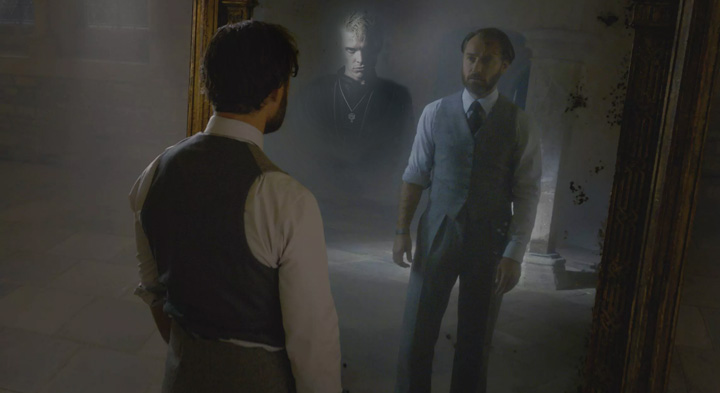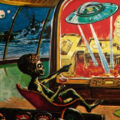Watched Fantastic Beasts and The Crimes of Grindelwald (2018), in which Grindelwald doesn’t do much. While I like most of the characters being further developed and the film is overall well directed, the weakest element was the story, written by J. K. Rowling. I’m sorry to disagree with the genuine fans of the series, but this film is a gigantic mess.
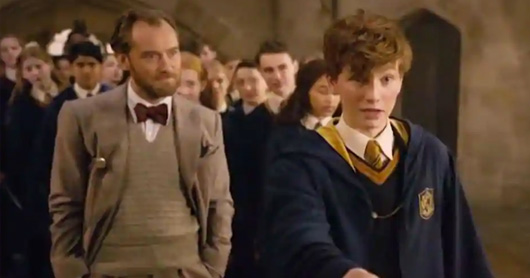
Starting with the positive, I quite enjoyed the few main characters. Newton Scamander is socially awkward and connects better with animals, but has a heart of gold and is very good at his interest (animal keeping). That’s not different from the first, but he’s a type of character I really like.
Jude Law’s Dumbledore was on point, and I hope to see him playing a bigger role. Johnny Depp’s Grindelwald was not terrible, but he didn’t look invested in the role as much and was just reading the lines. To be fair, he wasn’t given enough material to shine. And that’s as much praise as I have for the film. The characters we already knew are great.
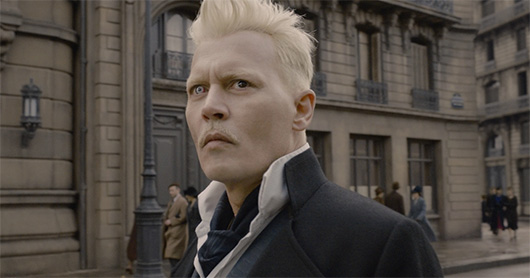
By this point, it seems clear that Rowling’s writing strength is in characters and wealth of ideas for individual scenes, but not narrative structure. That has always been my problem with the series, and my favourite entry was the only co-written one, The Cursed Child (2016). Her structure problem shows in in this film the lack of clear reason for many characters’ actions, if not existence.
Opposite the Harry Potter series which usually has only one plot line, Crimes of Grindelwald has approximately seven subplots. Each one feels weak and contrived, hard to follow, and none feels more important than the other.
The sloppy writing is shown not only in each character development, or how magic is over/underused to the convenience of the plot. Magical elements of the story constantly break the rules it sets, and acts as a tool to serve the whim of the writer.
That was a problem with all Harry Potter entries and especially the last film which devaluated wands to mere firearms and teleportation devices (the introduction of wand apparition is so infuriating), and it is especially noticeable when someone fails because they did not use magic. I couldn’t even get past the first five minutes without full of questions in my head.
Another problem with HP story structure was the plot reveal at the end, where a bad guy explains everything that’s been happening the whole time, spending a chapter or two before attempting to kill Harry.
This is normally how a detective novel would be structured (e.g. Sherlock Holmes connects everything together at the end), and already this felt quite contrived but forgiven in the original books, because a child student might not witness everything the story needs. Here, we have tons of Aurors (i.e. magic police detectives) and an animal specialist who Dumbledore deems capable of his ‘search & destroy’ missions, and Rowling still cannot let them discover the story by themselves and uses the same trope. The reveal itself is so incredibly contrived and complicated, and still makes no sense, probably the worst in the series. And it becomes increasingly apparent that Newt Scamander has no personal stake in the story.
My complaints can go on and on. The writing reminded me of Jurassic World: The Fallen Kingdom (2018), which is not a compliment – because Rowling is known for her writing.
I think the closest parallel I can draw is George Lucas, who had become so Big and Famous to challenge by the time he got around to making Star Wars Episode One – and nobody questioned his creative decisions. That led to a boring and incoherent prequel trilogy.
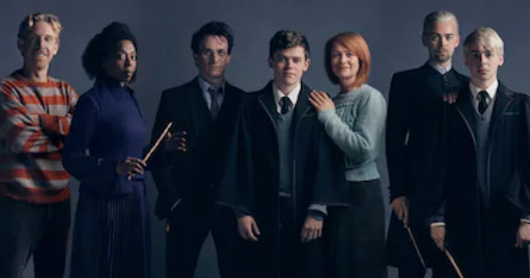
Any creative person should understand the value of extra pair(s) of eyeballs to critique on your work. J. K. Rowling desperately needs to have some, and she does a remarkable job when she does. In my opinion, The Cursed Child is the best Harry Potter because of that (and the most misunderstood one because they published the script, an unfamiliar form of writing for most people).
The Crimes of Grindelwald is a thin and undercooked Sunday roast, covered by a much thicker layer of gravy sauce of creative talents and fan service.
And what is the crimes of Grindelwald? The film does not show, just like the first film didn’t show where to find fantastic beasts. 4.5/10
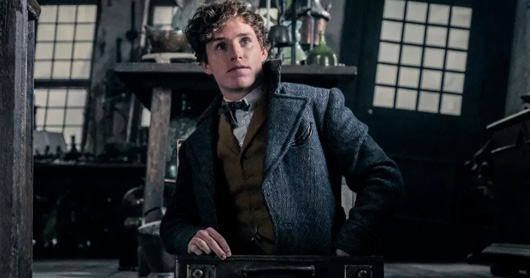
And here’s some spoilerrific questions/discussions to those who have already seen the movie:
· Grindelwald swaps his body with his follower and goes to rescue him, but he is shown to have no compassion just like Voldemort. Why did he bother to go after the horse cargo?
· Why didn’t the escorts on broomsticks do anything to Grindelwald?
· Why did Grindelwald save the British minister of magic?
· Jacob clearly had his memory erased in the last film but it was apparently ‘only the bad ones.’ Then there should be so many people who remember witnessing magic in New York. Was anyone convinced by this plot point?
· Nagini is absolutely useless in the story. Being able to turn into animals is not a rare ability. Why does that work as a circus attraction to witches and wizards? She not only does nothing for the rest of the film, and the fact that the snake was human hurts the main HP story a lot. The point of the relationship between Voldemort and Nagini was that he trusted animals (particularly snakes) more than humans, not because Nagini had a special background. Also, Neville Longbottom decapitated a lady.
· Grindelwald is shown to have no mercy towards his associates, which is a recycled Voldemort character, but he wants to prevent World War II by conquering the muggle society. Those two don’t work together. It also establishes that the magic community could have stopped the World War II and the main characters let it happen at the end. And there is nothing interesting about a villain whose motivation is not clear.
· Queenie comes to Paris and fails to find both her sister and the Newt & Jacob duo, as if she is incapable of using magic. She is then invited to Grindelwald’s hideout so that she is told where to go at the climax of the film. She joins the team Grindelwald, a group who plans to annihilate muggles, because she loves one. It hurts my brain as I type this sentence. I like how she creates split in the main characters’ relationships, but everything she does is dumb.
· The archivist with the cats also targets Leta, who visited the place via official means. The camera stays on the archivist’s face for too long, suggesting that she has her own agenda (which turns out to be false). And Leta attack her cats although she has absolutely no reason to do so.
· Jacob visits the graveyard and is stopped by Yusuf Kama. Next time the film cuts to them, Jacob is nowhere to be seen and Yusuf is confronting Creedence and Nagini.
· Why did Yusuf need to exist in this story? Seems like he could have been easily cut out. His eye infection doesn’t serve any purpose other than giving false tension, and he wants to kill Creedence more than Leta, who is a much easier target. Also, given that the Lestrange should be large family in this universe, there should be plenty of other low hanging fruits if he needed to kill someone that fits his purpose.
· Leta Lestrange and Yusuf Kama’s backgrounds are FUBAR. This whole mess partially comes from reusing Lestrange name and hiring non-white actors.
· So, Leta swapped a baby that didn’t stop crying, with another who conveniently wore the same outfit, conveniently in THE TITANIC, conveniently on the day that the ship sank, and conveniently lost her true brother to waves? And by the way, both Leta’s and Corvus’s mothers died after birth?
· The final confrontation is also a big mess. The main characters were lured into the place, which suggests that Grindelwald had plans for them. They are trapped in an enclosed space where they cannot escape, but Aurors just casually walk in. Then, he reveals his plan to his Parisian followers and convinces them to join his fascist cause. He summons big blue fire dragons with the intent to destroy the whole of Paris, the hometown of the followers h’s just garnered. All through the scene, Grindelwald pays no particular attention to the main characters he trapped, and the fact that they were there feels incidental. What was his plan? And when everyone was after Grindelwald, why did he have to lure them? They would come to him anyway.
· Creedence’s true identity turned out to be a Dumbledore who had never been mentioned, as if Albus didn’t have enough sibling problem. To make the background a bit more solid, the film introduces a little baby bird in the middle of the film out of nowhere, which Creedence seemed have been carrying along. Just like the Dumbledore reveal itself, the bird had no set-up.
· Newt Scamander is someone who is good with animals and does not belong to Hogwarts or the Ministry, which is convenient for Dumbledore. Apart from that, there is no personal conflict between Newt and Grindelwald and the story focus is already shifting towards Dumbledore. I really like the character, and he deserved his own story.
—toshi omagari
Flommist Toshi Omagari fights many things, most recent of which is the auto-correction of his title to florist. Copyright © 2018 Toshi Omagari.
PLEASE SUPPORT FLOMM
TIPS + DONATIONS DISCREETLY ACCEPTED






